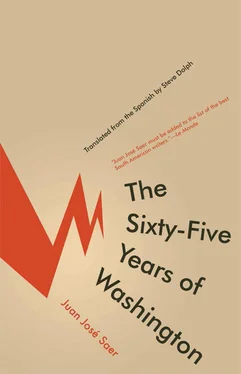Juan José Saer - The Sixty-Five Years of Washington
Здесь есть возможность читать онлайн «Juan José Saer - The Sixty-Five Years of Washington» весь текст электронной книги совершенно бесплатно (целиком полную версию без сокращений). В некоторых случаях можно слушать аудио, скачать через торрент в формате fb2 и присутствует краткое содержание. Год выпуска: 2010, Издательство: Open Letter, Жанр: Современная проза, на английском языке. Описание произведения, (предисловие) а так же отзывы посетителей доступны на портале библиотеки ЛибКат.
- Название:The Sixty-Five Years of Washington
- Автор:
- Издательство:Open Letter
- Жанр:
- Год:2010
- ISBN:нет данных
- Рейтинг книги:3 / 5. Голосов: 1
-
Избранное:Добавить в избранное
- Отзывы:
-
Ваша оценка:
- 60
- 1
- 2
- 3
- 4
- 5
The Sixty-Five Years of Washington: краткое содержание, описание и аннотация
Предлагаем к чтению аннотацию, описание, краткое содержание или предисловие (зависит от того, что написал сам автор книги «The Sixty-Five Years of Washington»). Если вы не нашли необходимую информацию о книге — напишите в комментариях, мы постараемся отыскать её.
The Sixty-Five Years of Washington — читать онлайн бесплатно полную книгу (весь текст) целиком
Ниже представлен текст книги, разбитый по страницам. Система сохранения места последней прочитанной страницы, позволяет с удобством читать онлайн бесплатно книгу «The Sixty-Five Years of Washington», без необходимости каждый раз заново искать на чём Вы остановились. Поставьте закладку, и сможете в любой момент перейти на страницу, на которой закончили чтение.
Интервал:
Закладка:
Leto raises his arm and points to the next sidewalk, some twenty meters ahead.
— Tomatis, he says.
The Mathematician interrupts himself and looks in the direction Leto just finished pointing, somewhat disoriented at first, as if coming out of a daydream, and when he understands, nods, and a smile starts to appear on his face.
— Indeed. Pane lucrando , he says.
Indeed; and, as the Mathematician would say, pane lucrando . In shirtsleeves, his head turned to the south, on the upper step of the reconstituted granite stairs that lead to the main entrance of La Región , intersecting the door, between the windows that display the two black plush boards where movable white brass letters are arranged into the headlines of the day. Tomatis is lighting a cigarette, with the match cupped between his hands — even though there isn’t the slightest breeze and he could just as easily have exposed the flame to the morning air without any danger of it going out. A tall, well-dressed man carrying a portfolio under his arm, and who Tomatis, occupied with lighting his cigarette, is blocking from leaving the newspaper, gives him a little nudge on the shoulder, so that Tomatis, surprised and serious, turns and at the same time moves a few centimeters away, to let him pass, with considerable ill will, stepping down without dignifying the other man’s passing, purely cordial, thank you , with a response. From the lower step, while he pockets the matches, without taking the cigarette from his lips, he continues to gaze toward the south, indifferent to the turmoil on the street. The cars pass, very slowly, in both directions, intercepting, intermittently, the sidewalk in front of the newspaper, so that Tomatis, standing on the first step of the main entrance, vanishes and reappears, discontinuous and fragmentary, to Leto and the Mathematician. Seems like he’s in a bad mood , says the Mathematician, less as a result of a genuine observation than as a display, for Leto’s benefit, of intimacy with Tomatis; and Leto, for very similar reasons: Seems like it .
But it’s not exactly that, no — not a bad mood. No. Tomatis, who is facing south, as I was saying, directly toward the city center in fact, and in spite of the passing cars, of the people coming and going, of the morning sun — because it is, as I was saying just now, the morning — of the uneven and shifting excess of the observable, to use just one of its possible names, has been, since he awoke in bed, in a troubled and painful state, externally manifested by a wrinkled shirt, stained pants, and a three-day-old beard, along with an absent and preoccupied expression. Since he woke up, reality has threatened him — reality, no? another name, and one of the most unfortunate possible for it, and which could imply, because of its obstinate opacity, menace and danger. Once in a while that buildup of danger visits him and covers, darkening without exception, everything. The day before he was fine, in line with himself and the world, and though the day passed without particular incident, he, Tomatis, no? also spent it without divergence, well-formed to its mold, strictly at pace with his actions and indistinguishable from each of them, waking up, going to work, eating, neutral memories and calm plans, conversations, a walk on the waterfront in the afternoon, taking advantage of the weather, and after dinner some reading by lamplight, on the terrace — a full, consistent spring day, without accident, with its mild tint of permanence, of continuity, of unequivocal and complete existence, one of those days that, with its smooth and monotonous regularity, must have given birth to the idea of eternity. Around midnight, without variation, he had gone to bed, and he, Tomatis, who from time to time, and for weeks, had suffered insomnia, manifested with increasingly desperate tossing in bed until he was, as they say, surprised by the dawn, had, the night before, fallen asleep immediately, without dreaming, sleeping so peacefully that when he woke up the next morning the first thing he noticed was that the bed, with him well-encased between the two sheets, was almost perfectly made, as if he had just gone to bed. Nevertheless, at the same moment, unexpectedly, the menace, indefinite and darkening, like in the past, had already installed itself. Right away, things shipwreck against it — or rather, the Thing, the universe, no? and if you like, another way of referring to it, what there is or what is happening or where it is or where it’s happening, or both at once, as if he were passing through zones, through regions, helpless and blind, just a creature, not an individual or a character or a person, troublesome, as they say, and mortal more than anything, wallowing in the empirical until the unimaginable shock of the blackout. And Tomatis, uncertain, indecisive, waits, through the day laced with danger, to receive a blow from he’s not sure where, nor of course why, his mind somewhat dirty, like a half-buried glass, covered, you could say, in dried ash and, if you like, full of constituent bubbles and knots that deform what you see. There he is now, sucking the cigarette anxiously, too quickly, absently biting his upper lip, lost to the bright turmoil thickening to the south on the central avenue. From the opposite sidewalk, as they approach, Leto and the Mathematician experience the same tenuous euphoria produced at any unexpected encounter with someone whose company is pleasurable, observing Tomatis’s morose posture, his shoulders slumped, his contracted stillness disturbed every so often by awkward and uncoordinated, as they say, movements of his arm or head. When they are even with Tomatis, they stop at the edge of the sidewalk, calling him between the cars, and they have to whistle, click, and shout two or three times before pulling him from his distraction, but when he finally hears them, and sees them shouting and gesturing on the opposite sidewalk after searching various points on the street with a murky and uncertain gaze, a wide smile, without any artificial doubt, where traces of anxiety still persist, spreads across his unhappy face. Tomatis approaches the cable guardrail as well and, laughing and shaking his head, shouts something incomprehensible in the Mathematician’s direction.
— Eh? says the Mathematician, leaning a little toward the opposite sidewalk in order to hear him better, and when Tomatis speaks again, raising his voice some, the sound of a scooter accelerating between the two rows of cars drowns out his words again. The Mathematician makes exaggerated faces, trying to hear, shakes his head several times without stopping his laughter, to demonstrate his annoyance, and then, repeating a gesture to Tomatis that indicates he should wait, steps into the street and, quickly moving around the slowly passing cars, starts to cross. More carefully, Leto, whom the Mathematician seems to have forgotten completely, resigns himself to following, lagging a few meters behind and thinking, as he approaches Tomatis and the Mathematician on the opposite sidewalk, amazed at the contrast their external features present: With the way they dress each makes a fiction out of his body.
There they are, in fact, hugging, on the sidewalk, patting each other on the shoulders, on their backs, their arms: the Mathematician, dressed completely in white, including the, etc., etc., no? as I was saying, and Tomatis, his dark messy hair, his three-day-old beard, the shirt and pants he would have changed this morning, after having shaved and taken a warm shower, if the menace, occupying Everything — which could go by another name, no? — had not been ravaging every one of his movements, even the most mundane, needs, tastes, and senses: If no matter what I’m going to. . and sooner or later the whole universe is going to. . what goddamned reason is there to shower and change your pants , he thinks, with tiny depressed shivers more so than with clear images or words, abandoning himself, with black fingernails and dirty feet, to a foreseen decomposition. Separating himself from the Mathematician, Tomatis aims a severe and at the same time jesting look at Leto.
Читать дальшеИнтервал:
Закладка:
Похожие книги на «The Sixty-Five Years of Washington»
Представляем Вашему вниманию похожие книги на «The Sixty-Five Years of Washington» списком для выбора. Мы отобрали схожую по названию и смыслу литературу в надежде предоставить читателям больше вариантов отыскать новые, интересные, ещё непрочитанные произведения.
Обсуждение, отзывы о книге «The Sixty-Five Years of Washington» и просто собственные мнения читателей. Оставьте ваши комментарии, напишите, что Вы думаете о произведении, его смысле или главных героях. Укажите что конкретно понравилось, а что нет, и почему Вы так считаете.












